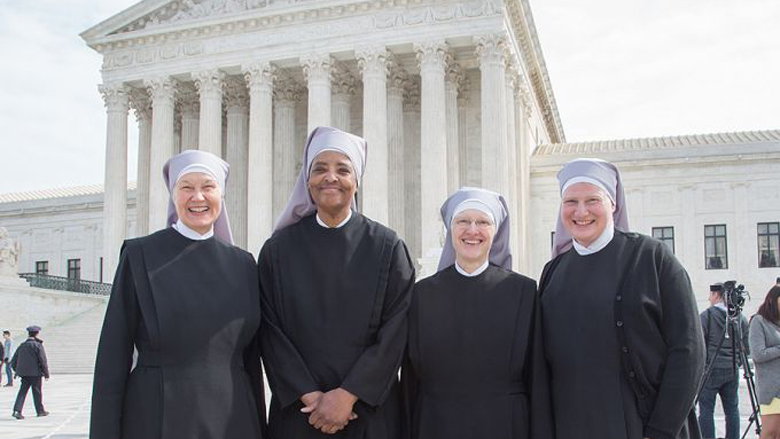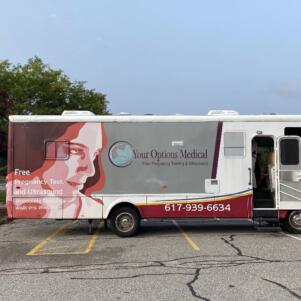US Bishops to government: End legal standoff with the Little Sisters
By Catholic News Agency | September 13, 2016, 6:35 EDT
 Little Sisters of the Poor outside the Supreme Court of the Unite States after oral arguments for their case against the HHS mandate, April 14, 2016. Credit: Becket Fund for Religious Liberty.
Little Sisters of the Poor outside the Supreme Court of the Unite States after oral arguments for their case against the HHS mandate, April 14, 2016. Credit: Becket Fund for Religious Liberty. Washington D.C. — The United States government has an opportunity to end its legal battle with the Little Sisters of the Poor and the administration must “seize that opportunity,” legal experts are maintaining.
“In a nation dedicated to religious liberty, church-state conflict on this scale should be avoided whenever possible – and once started, ended as soon and as agreeably as possible,” legal counsel for the U.S. Conference of Catholic Bishops stated in Sept. 9 comments to the Centers for Medicare and Medicaid Services.
They added that “it has now been spelled out with particular clarity how the Administration can achieve its stated policy goals without forcing those with sincerely held religious objections to assist.”
The health care law, passed in 2010, ordered that “preventative care” be covered in all health plans. In regulations released later on, the Department of Health and Human Services interpreted that to mandate coverage for contraceptives, sterilizations, and drugs that can cause early abortions.
Afterwards, the administration announced a process for non-profits to “opt-out” of the mandate, but many groups – including Catholic dioceses and the Little Sisters of the Poor – said the so-called accommodation still forced them to violate their religious beliefs against cooperating with contraceptive use. Over 300 plaintiffs have sued the administration over the mandate and its “accommodation.”
The case against the mandate of the Little Sisters and other petitioners like the Archdiocese of Washington and Bishop David Zubik of Pittsburgh was heard by the Supreme Court last year.
After hearing oral arguments in the case, the court requested supplemental briefs by both the petitioners and the administration that would outline possible alternative means of providing contraception coverage for employees of objecting non-profits while respecting the consciences of the nuns and other religious employers.
After receiving the briefs, the court in May sent the case back to the lower courts and said that both the nuns and the administration should find a solution.
“Following oral argument, the Court requested supplemental briefing from the parties addressing ‘whether contraceptive coverage could be provided to petitioners’ employees, through petitioners’ insurance companies, without any such notice from petitioners,” the court noted. “Both petitioners and the Government now confirm that such an option is feasible.”
However, Bishop Zubik of Pittsburgh, one of the plaintiffs in the case, said in August that the administration was being “extremely aggressive” and was “apparently trying to take over” his diocese’s health plans by forcing the third-party administrator of the plans to provide contraceptive coverage.
Now the administration is taking comments on whether an alternative solution can satisfy the Little Sisters and other petitioners “while still ensuring that the affected women seamlessly receive full and equal health coverage, including contraceptive coverage.”
Such a solution does exist, the USCCB comments affirmed. There is only one path to an agreement on the matter, and that is if the Little Sisters and other non-profits come up with the modifications to the mandate, they stated.
If insurers for the non-profits have to provide the contraception coverage, they continued, it must be provided as the plaintiffs had previously requested – “truly independent of petitioners and their plans” such as “through a separate policy, with a separate enrollment process, a separate insurance card, and a separate payment source, and offered to individuals through a separate communication.”
There are concrete ways to achieve this, the comments noted. For instance, employees seeking contraception coverage could have a separate plan for it under the same insurer, like they might have for dental or vision coverage. They could also purchase a health plan with contraception coverage on the state exchanges set up under the Affordable Care Act. The government could also create a separate plan to provide the coverage.
However, the bishops in no way endorse the use of contraceptives, which is against Church teaching, the comments insisted. Rather, they are pointing out that alternative methods exist for employees to have contraception coverage – which is the government’s goal – while not forcing religious groups to violate their beliefs.
“The intended effect of contraceptives is to take a perfectly healthy human reproductive system and render it temporarily or permanently infertile. As a matter of sound health care policy and practice, this is entirely backwards, as the goal of medicine, properly understood, is to cure or prevent health problems,” the comments explained.
“Contraceptives not only fail to cure or prevent health problems, they actually cause such problems. Indeed, today there is a virtual cottage industry of litigation against pharmaceutical manufacturers involving injuries resulting from contraceptive use,” they added, noting the HHS’s own research showing a heightened risk of cancer from the use of oral contraceptives.
“The petitioners have done their part by describing, in good faith and in great detail, a way to reach an amicable resolution. But the petitioners cannot change the regulations – only the Administration can do that. And so once again, we urge the Administration, in the strongest possible terms, to do its part to end this well, by choosing to pursue its policy goals in a way that fully respects – rather than knowingly disregards – the sincerely held and repeatedly stated religious objections of a substantial minority of our civil society.”
— Written by Matt Hadro











